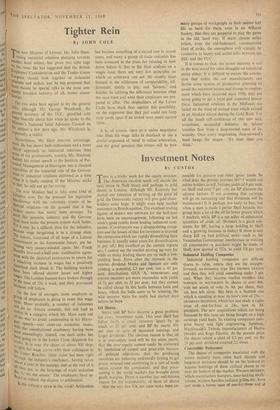Tighter Rein
By JOHN COLE
HE new Minister of Labour, Mr. John Hare,
IT
seeing industrial relations plunging towards another hard winter, has given two tight tugs
l'''' the reins. He has suggested that the British Congress Confederation and the Trades Union `-nngress should look together at industrial . relations and strikes, and he has propoSed that there should be special talks in the most con- ! 5 ,tantlY troubled industry of all, motor manu- 1 facture.
The two sides have agreed to try the general
,
' talks, although Mr. George Woodcock, the general secretary of the TUC, sprinkled cold water liberally about him when he spoke to the Minister's National Joint Advisory Council on the subject a few days ago. Mr. Woodcock is, supremely, a realist.
• Nevertheless, Mr. Hare deserves encourage- ment. He has shown both enthusiasm and a more
liberal approach to industrial relations than
some of his predecessors, notably Mr. Macleod. Indeed, his recent speech to the Institute of Per- ' ScInnel Management at Harrogate was a classical "Position of the impartial role of the Govern- illrent ill industrial relations delivered at a time when it is badly needed. If the Minister sticks to that, he will not go far wrong.
1 he new Minister' had to take some kind of 1nitiative now, for the pressure for legislative interference with the voluntary system of in- dustrial relations—on the ground that it has broken down —has rarely been stronger. To resist this pressure, industry and the Govern- ment must make the present system work better. Yet et it may be a difficult time for the initiative, because wage bargaining is in a strange state. The unions, frustrated of all hope of a Labour e"nvernment in the foreseeable ,future, arc be- u"ling very money-minded again. Mr. Frank "axeli's two-and-a-half-year stabilisation agree- ment with the electrical contractors in return for a Whacking increase in wages has a positively nierican dash about it. The building workers have been offered shorter hours and higher wages, The London busmen have broken through t'
,_° the tune of 25s. a week, and their provincial brethren will follow.
On the law of averages, sonic employer or gr°4 of employers is going to resist this wage c,ycle. More probably, a number of industries strikes do so. Almost certainly, this will lead to rikes in a category which Mr. Hare went out of Da,nis Way to avoid condemning in his Harro- gate speech—over clear-cut economic issues, Used the constitutional machinery having been been unavailingly. Indeed, one such strike has ‘Neen going on in the Lower Clyde shipyards for Zks. It is over the claim of about 300 ship- th 'gilts for wage parity with their colleagues in the_01-1Pper Reaches. Their claim haS been right "I- ugh the industry's machinery, having taken about a Year in the passage, and at the end of it ii, they arc, as the language of trade unionism f:s il. 'on the stones.' The employers have re- set' to submit the dispute to arbitration. 15 this refusal a straw in the wind? Arbitration
has become something of a sacred cow in recent years, and many a group of trade unionists has been trounced in the press for refusing to bow down before it. But in the final analysis on a wages issue there are very few principles on which an arbitrator can act. He usually loses himself in the wilderness of comparability, dif- ferentials, ability to pay,. and 'fairness,' and finishes by splitting the difference between what the men want and what their employers are pre- pared to offer. The shipbuilders of the Lower Clyde have stuck firm against this possibility, on the argument that they just could not keep their yards open if an award were made against them.
It is, of course, open to a union negotiator who finds his wage talks in deadlock to use a similar argument of 'need' to refuse arbitration, and the great question this winter will be how many groups of workpeople or their unions feel life so hard for them, even in an Affluent Society, that they are prepared to play the game in the old, hard way. If many choose strike action, even the old-fashioned, constitutional kind of strike, the atmosphere will scarcely be conducive to happy and useful talks between the BEC and the. TUC.
If it comes to that, the motor industry is not in the best mood for calm thoughts on industrial peace either. It is difficult to escape the conclu- sion that unless the car manufacturers can devise some system of production planning to avoid the recurrent booms and slumps in employ- ment which have occurred since 1956, they are never going to get a loyal and contented labour force. Industrial relations in the Midlands are based on the kind of mutual trust which existed in an Alaskan saloon during the Gold Rush. For all the brash self-confidence of this new and, sometimes, successful industry, its labour troubles flow from a deep-rooted sense of in- security. Over every negotiating shop-steward's head hangs the slogan : 'It's later than you think.'














































 Previous page
Previous page